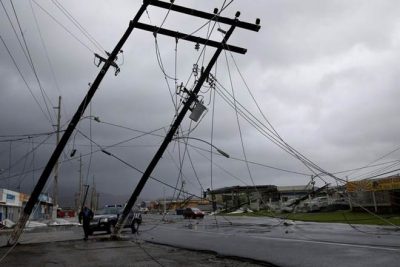Report Shows Puerto Rico’s Hurricane Death Toll Likely in Thousands, Far Higher than Official Count
In the weeks after Hurricane Maria pummeled the island, the mortality rate has risen sharply over previous years

Trump critics drew attention to a New York Times report on Saturday regarding the estimated death toll in Puerto Rico as a result of Hurricane Maria, which left the island devastated after making landfall in September. While the official count of fatalities stands at 64, the Times’ analysis found that a more realistic estimate would be in the thousands.
The newspaper reported that since Maria hit 42 days ago, 1,052 more deaths than usual have happened in the U.S. territory. The mortality rate has grown as half of Puerto Rico is still without power. A month after the storm, about one million residents did not have access to safe drinking water, and many were desperately using water from a Superfund site to bathe and drink.
The dire conditions Puerto Ricans were faced with following the storm have led researchers to believe that Maria was responsible for far more deaths than the government has admitted.
Wanda Llovet, the director of Puerto Rico’s Demographic Registry, told the Times that deaths went up sharply just after the hurricane.
“Before the hurricane, I had an average of 82 deaths daily,” said Llovet. “That changes from September 20 to 30. Now I have an average of 118 deaths daily.”
As officials were noting the rising mortality rate, President Donald Trump downplayed the impact of the storm while Carmen Yulin Cruz, the mayor of San Juan, made urgent appeals for a massive push in aid delivery to the island.
On October 3, when 556 more people had died since the storm hit than had in the same period the previous year, Trump confidently reported that only 16 people had been killed as a result of the storm.
Earlier this week, the Center for Investigative Journalism also found from its own analysis that the death toll from Maria was likely in the thousands.
According to death records, fatalities from sepsis, often resulting from severe infection and unsanitary conditions in homes and hospitals, went up 50 percent from last year in the weeks after the storm.
The chief of mortality statistics at the National Center for Health Statistics, Robert Anderson, told the Times that there was “fairly compelling evidence that that increase [in mortality] is probably due to the hurricane,” and stressed the importance of accurately reporting the number of deaths from a disaster like Maria.
“If we have a lack of information, we can’t adequately prepare for the next disaster. We can’t put measures in place to prevent deaths occurring in the future,” said Anderson.
On social media, politicians and journalists highlighted the report and called for the Trump administration to grapple with the reality of the storm’s impact.
I remain alarmed by death toll from Maria in #PuertoRico which is certainly higher than has been officially reported as noted in this article: https://t.co/MzJAGKkP4F I again call for audit of these numbers given @RealDonaldTrump thinks count reflects well on federal response!
— Rep. Nydia Velazquez (@NydiaVelazquez) December 8, 2017
The Trump administration has not been honest with the world about the death toll in Puerto Rico. https://t.co/2O7fuquN89
— Justin Hendrix (@justinhendrix) December 9, 2017
Appalling. I asked DHS IG weeks ago to investigate misreported death toll in Puerto Rico after devastation of Maria. https://t.co/rgzFB8Q8Eo
— Richard Blumenthal (@SenBlumenthal) December 9, 2017
This work is licensed under a Creative Commons Attribution-Share Alike 3.0 License

